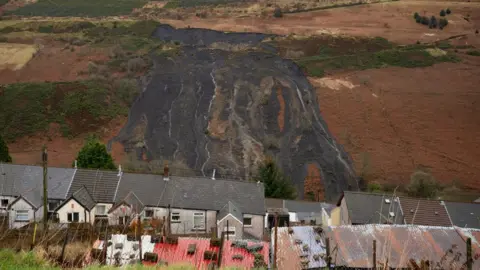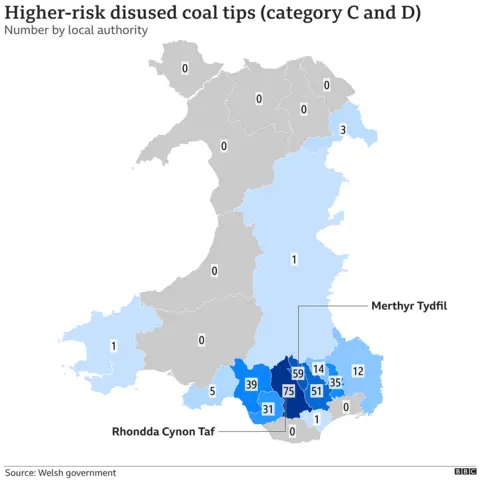Coal tips: Phone alert system promised for residents
 Getty Images
Getty ImagesPeople living under coal tips will receive mobile phone alerts warning them if there is any danger, the Welsh government has said.
Climate Change Minister Julie James said she hoped the system would never have to be used, but it was important people did not "live in fear" of sudden landslips.
The latest data suggested there are 2,456 disused coal tips in Wales.
Around one in seven are classed as high risk.
"It's very concerning," Ms James told BBC Wales Live, also confirming the Welsh Government, rather than the UK government, would have to pay for measures to make the tips safe.
The cost, she estimated, would be "hundreds of millions of pounds".
"We've been doing the tech tests that we need to make sure we've got the right equipment on the right tips," she said.
"That it detects the right kinds of issues and that we have the right kinds of alerts for people, so they get the information they need but not information that's unduly alarmist.
"It will be an app on your mobile phone effectively, and then you'll get an alert if there is a problem.
"Hopefully, there will never be a problem because the other thing we're doing is putting in the mitigation measures to make sure that we don't have slips and movement.
"But we want people to be alerted if there is a problem."

Scientists recently argued that Wales needed to look out how other countries dealt with natural disasters like volcanos and tsunamis, with climate change increasing the risk of landslips at former coal sites.
Last week, the Welsh government released a council-by-council breakdown of where Wales' old coal tips are, but has not yet revealed the precise location of sites despite pressure from opposition parties and residents.
Ms James said data on tip locations still needed to be checked and it would be published in early 2022, when ministers were sure it was "accurate and correct".
She acknowledged that insurance and housing could potentially be affected for some people.
"We will be looking to see what we can do with the insurance industry," she said.
"For example speaking to people, as we do for floods, to make sure that we have the right kinds of schemes.
"So, for example to make sure that our social house providers are all aware as well, to make sure that our tenants are protected.
"We are very aware that people need to have the right information at the right time."
